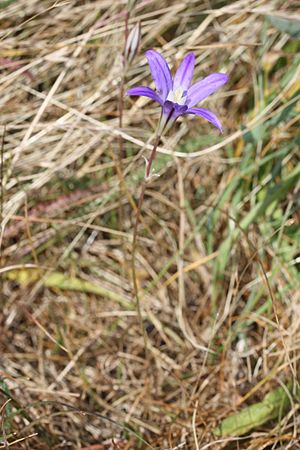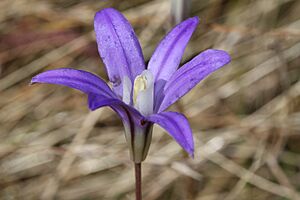Crown brodiaea facts for kids
Quick facts for kids Crown brodiaea |
|
|---|---|
 |
|
| Crown brodiaea | |
| Scientific classification | |
| Genus: |
Brodiaea
|
| Species: |
coronaria
|
| Subspecies | |
|
Brodiaea coronaria subsp. coronaria |
|
| Synonyms | |
The crown brodiaea (scientific name: Brodiaea coronaria) is a beautiful wild flower. It's also called the harvest brodiaea. You can find this plant growing naturally in western North America, from British Columbia in Canada all the way down to northern California in the USA. It loves to grow in mountains and open grasslands.
What Does It Look Like?
The crown brodiaea is a plant that comes back every year. It grows from a special underground bulb called a corm, which stores food. From this corm, a tall stem grows up to about 25 centimeters (10 inches) high. This stem holds a cluster of flowers.
Each flower looks a bit like a lily. It has a long tube at the bottom that opens up into a bell shape. There are six bright purple petals, each up to 3 centimeters (1.2 inches) long. Inside the flower, you'll see three stamens, which are the parts that make pollen. There are also some whitish, non-working stamens called staminodes.

How It Got Its Name
The scientific name of this plant has a bit of a story! The plant was first collected by Archibald Menzies during a trip called the Vancouver Expedition.
A botanist named Richard Salisbury first described it in 1808. But another botanist, James Edward Smith, later gave it a different name. Over time, scientists worked to make sure the plant had one clear, correct name. In 1917, Willis Jepson officially named it Brodiaea coronaria, which is the name we use today.
Different Kinds (Subspecies)
There are two main types, or subspecies, of this plant:
- Brodiaea coronaria subsp. coronaria – This is the common crown brodiaea.
- Brodiaea coronaria subsp. rosea – This type is called the Indian Valley brodiaea. It's a rare kind with pink flowers. You can only find it in a small area of northwestern California.
Uses
Long ago, Native Americans and early European settlers in North America would dig up and eat the small bulbs (corms) of the crown brodiaea. They are safe to eat raw and are said to taste a bit like nuts or celery.
See also
 In Spanish: Brodiaea coronaria para niños
In Spanish: Brodiaea coronaria para niños

